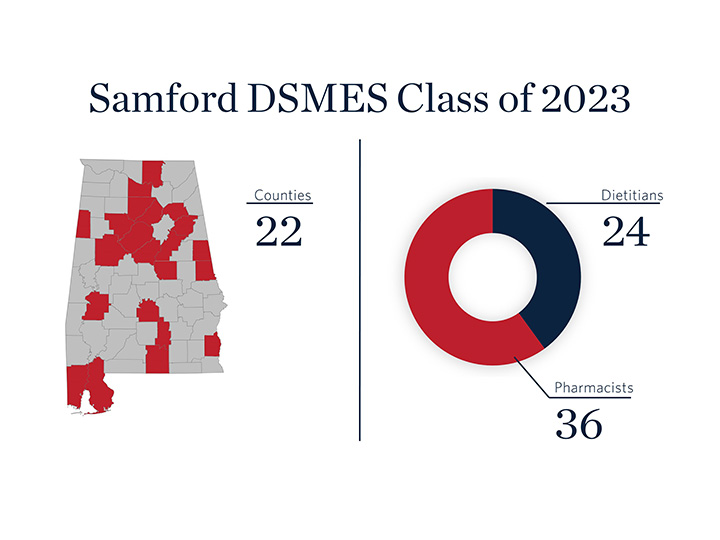
Thirty-six pharmacists; 24 dietitians; 22 counties; one cause.
With its largest cohort in program history, featuring 60 participants from 22 counties, Samford University’s Diabetes Self-Management Education and Support (DSMES) grant project is making significant strides in helping Alabamians diagnosed with diabetes.
Five years ago, Samford applied for and received funding from the Alabama Department of Public Health to support its efforts to improve health outcomes for Alabama residents with diabetes. Samford soon assembled an interprofessional team of faculty members from McWhorter School of Pharmacy and the Department of Nutrition and Dietetics in the School of Public Health.
The goal?
“To develop a program to increase the number of pharmacy and dietetics practices accredited to provide DSMES services to Alabama residents,” said Stephen Brown, assistant professor of pharmacy and the grant’s principal investigator. “Samford has taken a leading role in expanding capacity for DSMES services by training Alabama pharmacists and dietitians to provide DSMES services and assisting them in seeking accreditation.”
Brown said the program has grown each year. To date, 16 practices have earned accreditation, thus expanding the availability of DSMES services to 29 of Alabama’s 67 counties.
“I’m proud that we have been able to expand access to these important services across the state,” Brown said. “And I'm thankful for the support we’ve received from ADPH and from our other partners.”
Brown also praised the work and efforts of his co-investigators: P.J. Hughes, pharmacy professor and assistant provost for faculty success; Megan Kaal, instructor and clinical coordinator for the Department of Nutrition and Dietetics’ Dietetic Internship; and Keith Pearson, assistant professor in the Department of Nutrition and Dietetics.
Although this marks the grant’s final year of funding, Brown is more than pleased with the project’s progress.
“It’s exciting for Samford to be a part of making a positive difference in the health of Alabamians, and with this year's cohort being the largest so far, it appears that our reach has really grown,” he said. “There is still plenty of work to be done in this area, but working with pharmacists and dietitians these past five years has laid a firm foundation we can build on in the future.”
